Whitingham Surname Ancestry ResultsOur indexes 1000-1999 include entries for the spelling 'whitingham'. In the period you have requested, we have the following 23 records (displaying 1 to 10): Single Surname Subscription | | | Buying all 23 results of this search individually would cost £138.00. But you can have free access to all 23 records for a year, to view, to save and print, for £100. Save £38.00. More... |
These sample scans are from the original record. You will get scans of the full pages or articles where the surname you searched for has been found. Your web browser may prevent the sample windows from opening; in this case please change your browser settings to allow pop-up windows from this site. Pipe Roll
(1201-1202)
The Great Rolls of the Pipe are the central record of the crown compiling returns of income and expenditure from the sheriffs and farmers of the various English counties or shires. This is the oldest series of public records, and the earliest surviving instances of many surnames are found in the Pipe Rolls. Two sets of pipe rolls were prepared, not exact duplicates, the main series being the Treasurer's or Exchequer rolls, the copies (of which fewer have survived) being the Chancellor's rolls. The Chancellor's roll (or Antigraphum) for the 3rd year of king John became separated from that series at some date, and found its way to the miscellaneous records in the Chapter House at Westminster. As it happens, the Chancellor's roll for that year is in a better state of preservation than the Treasurer's roll, so it was chosen for publication by the Commissioners on the Public Records of the Kingdom, by whom it was printed in extenso in 1833. WHITINGHAM. Cost: £4.00.  | Sample scan, click to enlarge
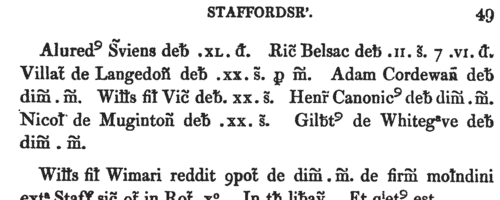
| Northumberland Assize Rolls for the General Eyre
(1256-1279)
The royal justices made periodic general eyres through all the shires of England, hearing civil and criminal cases that had accrued from the lower courts. Here we have the assize rolls of three Northumberland eyres, 24 April to 7 May 1256; 25 June to 15 July 1269; and 20 January to 9 February 1279. The bulk of the text relates to civil pleas from the county of Northumberland and the town of Newcastle upon Tyne; finishing with abstracts of the pedes finium, or feet of fines (lawsuits or pretended lawsuits establishing the ownership of land) arising at the three eyres. But there are also criminal cases (as in the scan here), lists of bailiffs, &c.WHITINGHAM. Cost: £4.00.  | Sample scan, click to enlarge

| Inhabitants of Claughton in Lancashire
(1332)
The Lancashire Lay Subsidy roll of the 6th year of king Edward III lists lay inhabitants of each township of the shire, with the amount of tax payable by each. The roll was edited by John Paul Rylands, and published in 1896. WHITINGHAM. Cost: £4.00.  | Sample scan, click to enlarge
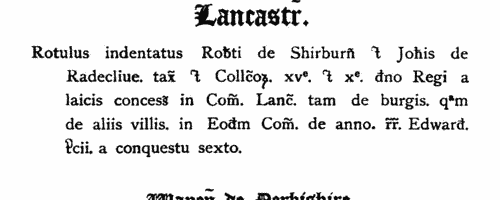
| The English in France
(1439)
King Henry VI of England (one of the grandsons of Charles VI of France) claimed the throne of France (and quartered the fleurs-de-lis of France with the lions of England on the royal standard) as had his predecessors since Edward III, as descendants of Philip IV of France. The English had real power or influence in Brittany, Normandy, Flanders and Gascony, and actual possession of several coastal garrisons, in particular Calais, where the French inhabitants had been replaced by English. Henry VI came to the throne only seven years after his father had trounced the French at Agincourt; but his cousin, Charles VII, who became king of France in the same year, spent his long reign rebutting the English king's claim to his throne by territorial reconquest and consolidation. The English administration kept a series of records called the French Rolls. On these are recorded royal appointments and commissions in France; letters of protection and safe-conduct to soldiers, merchants, diplomats and pilgrims travelling to France from England and returning, and to foreign legations. There are also licences to merchants to export to the Continent, and to captains to transport pilgrims. As Henry VI's reign progressed, and the English grip on northern France loosened, the French Rolls also increasingly include entries concerning the ransoming of English prisoners.WHITINGHAM. Cost: £6.00.  | Sample scan, click to enlarge
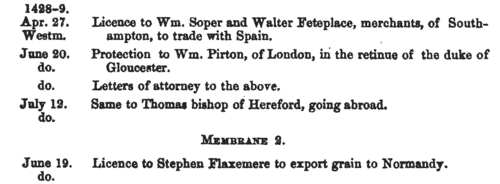
| The English in France
(1442)
King Henry VI of England (one of the grandsons of Charles VI of France) claimed the throne of France (and quartered the fleurs-de-lis of France with the lions of England on the royal standard) as had his predecessors since Edward III, as descendants of Philip IV of France. The English had real power or influence in Brittany, Normandy, Flanders and Gascony, and actual possession of several coastal garrisons, in particular Calais, where the French inhabitants had been replaced by English. Henry VI came to the throne only seven years after his father had trounced the French at Agincourt; but his cousin, Charles VII, who became king of France in the same year, spent his long reign rebutting the English king's claim to his throne by territorial reconquest and consolidation. The English administration kept a series of records called the French Rolls. On these are recorded royal appointments and commissions in France; letters of protection and safe-conduct to soldiers, merchants, diplomats and pilgrims travelling to France from England and returning, and to foreign legations. There are also licences to merchants to export to the Continent, and to captains to transport pilgrims. As Henry VI's reign progressed, and the English grip on northern France loosened, the French Rolls also increasingly include entries concerning the ransoming of English prisoners.WHITINGHAM. Cost: £6.00.  | Sample scan, click to enlarge
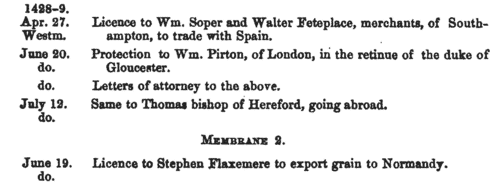
| The English in France
(1445)
King Henry VI of England (one of the grandsons of Charles VI of France) claimed the throne of France (and quartered the fleurs-de-lis of France with the lions of England on the royal standard) as had his predecessors since Edward III, as descendants of Philip IV of France. The English had real power or influence in Brittany, Normandy, Flanders and Gascony, and actual possession of several coastal garrisons, in particular Calais, where the French inhabitants had been replaced by English. Henry VI came to the throne only seven years after his father had trounced the French at Agincourt; but his cousin, Charles VII, who became king of France in the same year, spent his long reign rebutting the English king's claim to his throne by territorial reconquest and consolidation. The English administration kept a series of records called the French Rolls. On these are recorded royal appointments and commissions in France; letters of protection and safe-conduct to soldiers, merchants, diplomats and pilgrims travelling to France from England and returning, and to foreign legations. There are also licences to merchants to export to the Continent, and to captains to transport pilgrims. As Henry VI's reign progressed, and the English grip on northern France loosened, the French Rolls also increasingly include entries concerning the ransoming of English prisoners.WHITINGHAM. Cost: £6.00.  | Sample scan, click to enlarge
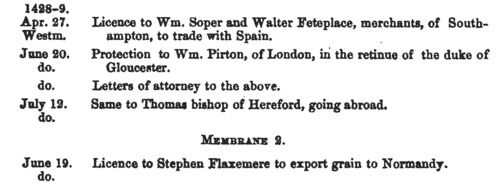
| Lichfield Diocese Ordinations: Acolytes Secular
(1504)
The diocese of Coventry and Lichfield at this period included the whole of Cheshire, Staffordshire and Derbyshire; all Lancashire south of the Ribble; northern Shropshire (including Shrewsbury); and northern Warwickshire (including Birmingham and Coventry). Ordinations took place on the four Ember Saturdays in the year, and on certain other occasions; lists of ordinands to the degrees of acolyte, subdeacon, deacon and priest were preserved in the ordination registers, a distinction being made between those clerks who were 'regular', i. e., monks, friars, &c., and those who were 'secular', the main body of the clergy. All ordinands were celibate, and those regular, and the secular who obtained benefices, remained so, but only a minority of the secular ordinands ever obtained benefices, and most will doubtless have married later in life. No man might be ordained to subdeacon or higher without proving either that he was of independent means or that he was sponsored by an institution or a gentleman. Most entries in the register of such ordinations therefore have the words 'ad titulum' followed by the name of the religious house that was the sponsor. This is an important indication of the man's origins - boys whose families were monastic tenants, and who were educated by the monks, would naturally be sponsored by the abbey. Only men who were born and bred in the diocese could be ordained by the bishop, unless producing letters dimissory from the bishop of the diocese of their birth. These are the ordinations celebrated on Ember Saturday, 1 June 1504 by Thomas bishop of Panados (Pavados), suffragan of bishop Geoffrey Blythe, in Lichfield cathedral.WHITINGHAM. Cost: £8.00.  | Sample scan, click to enlarge

| Wandsworth Burials
(1654)
The ancient parish of Wandsworth in Surrey comprised the single township of Wandsworth, including the hamlets of Garratt, Half Farthing and Summers Town. It lay in the archdeaconry of Surrey of the diocese of Winchester: unfortunately, few bishop's transcripts of Surrey parish registers survive earlier than 1800. Although the original parish registers of Wandsworth doubtless commenced in 1538, the volume(s) before 1603 had been lost by the 19th century. In 1889 a careful transcript by John Traviss Squire of the first three surviving registers was printed, and we have now indexed it year by year. The early burial registers contain little detail - date of burial, and full name. For the burial of children, the father's name is also stated; for the burial of wives, the husband's. Such details as date or cause of death, age, address or occupation are almost never given. The burial registers are considerably more bulky than the baptism registers, because the burying ground was used by Dissenters, who formed a large part of the population. WHITINGHAM. Cost: £4.00.  | Sample scan, click to enlarge
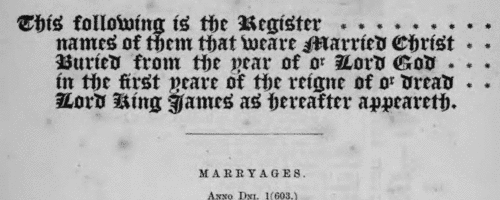
| Treasury and Customs Officials, Officers and Pensioners
(1709)
Government accounts, with details of income and expenditure in Britain, America and the colonies
WHITINGHAM. Cost: £6.00.  | Sample scan, click to enlarge

| Treasury Books
(1714-1715)
Records of the Treasury administration in Britain and the colonies, for August 1714 to December 1715. This is a digest of Treasury Minute Books T29/21-22; Disposition Books T61/22-23; King's Warrants T52/24, 26-29; Order Books T60/8-9; Plantation Auditor Out Letters T64/90; Caveat Book T64/40; Warrants Relating to Money T53/14, 16-25; Warrants Not Relating to Money T54/21-24; Lord Chamberlain's Warrants T56/18; Queen Anne's Debts T56/34; Customs Out Letters T11/16; General Out Letters T27/21-23; Ireland Out Letters T14/9-10; North Britain (Scotland) Out Letters T17/2-3; Affairs of Taxes T22/2; Reference Books T4/8-9; and Register of Papers Read at the Treasury Board T4/19: prepared by William A. Shaw for the Lords Commissioners of Her Majesty's Treasury.WHITINGHAM. Cost: £4.00.  | Sample scan, click to enlarge

|
Research your ancestry, family history, genealogy and one-name study by direct access to original records and archives indexed by surname.
|












